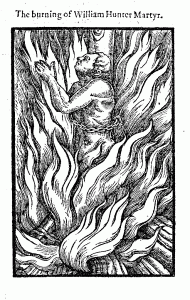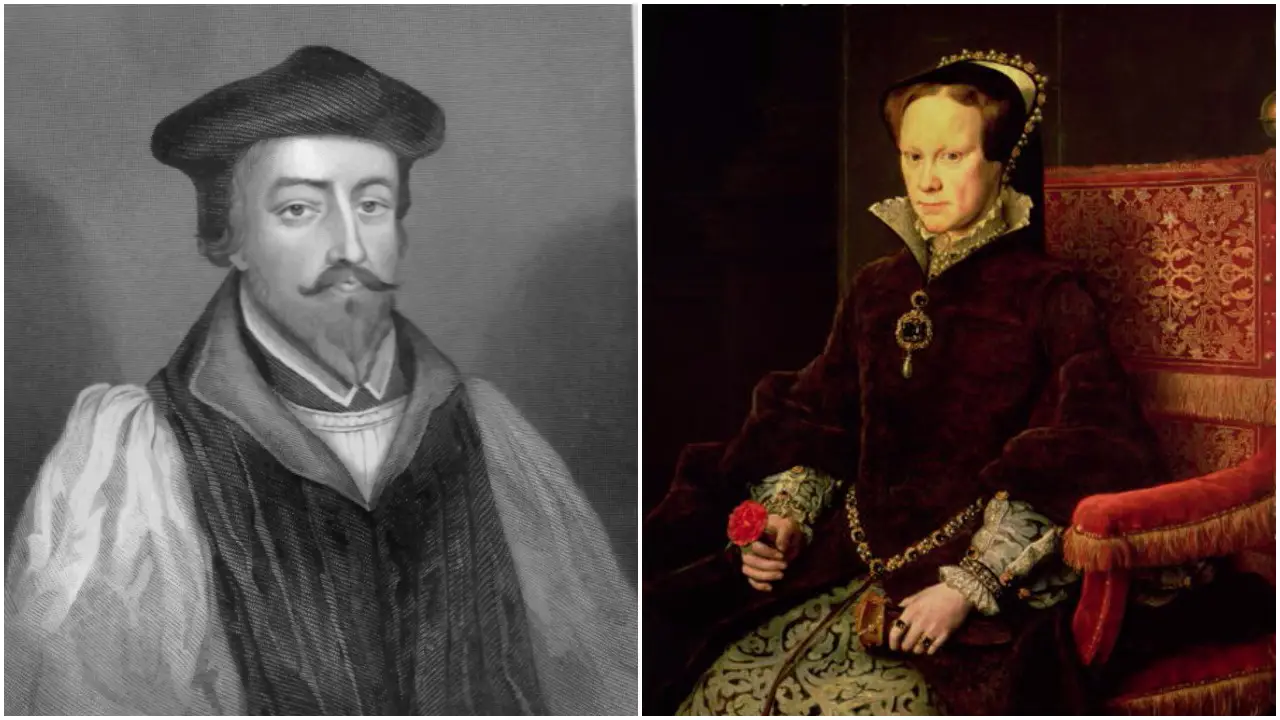 On 26th/27th March* 1555, nineteen-year-old William Hunter, a silk-weaver's apprentice, was burned at the stake in Brentwood, Essex, for heresy.
On 26th/27th March* 1555, nineteen-year-old William Hunter, a silk-weaver's apprentice, was burned at the stake in Brentwood, Essex, for heresy.
His story is told in John Foxe's Book of Martyrs and you can read the chapter on Hunter online at http://www.exclassics.com/foxe/foxe275.htm, but here is brief overview...
William Hunter was an apprentice to silk-weaver Thomas Taylor in London when Mary I came to the throne. After refusing to attend mass and receive communion at Easter 1554, he was threatened with being hauled before the Bishop of London. It was at this point that his master, Taylor, dismissed him "lest that he should come in danger because of him, if he continued in his house." Hunter returned to his home in Brentwood, Essex, but got into trouble when Father Atwell, of Brentwood Chapel, found Hunter in the chapel reading the Bible to himself. An argument between the priest and Hunter then ensued. The priest reported Hunter to Justice Anthony Browne, who called Hunter's father before him and ordered him to find his son and bring him to Browne. Hunter voluntarily came home and was put in the stocks by the local constable before being taken to Browne.
After an argument over communion, and Hunter's refusal to accept the Catholic doctrine of transubstantiation, believing communion to be soley "in remembrance" of Christ's sacrifice, Hunter was sent to the Bishop of London. Hunter refused to recant his beliefs. He was put in the stocks for two days and nights, but still refused to recant. He was then sent to prison and the bishop "commanded the keeper to lay irons upon him as many as he could bear". Foxe writes that Hunter was kept in prison for 9 months and how he was called before the Bishop of London five times during that time. He still refused to recant. Foxe records that he was condemned with five others in the consistory of St Paul's on 9th February 1555.
After his condemnation, Hunter was sent to Newgate and then to Brentwood. His parents were proud of their son's faith. Foxe records:
"In the mean time William's father and mother came to him, and desired heartily of God that he might continue to the end in that good way which he had begun: and his mother said to him, that she was glad that ever she was so happy to bear such a child, which could find in his heart to lose his life for Christ's name's sake.
Then William said to his mother, 'For my little pain which I shall suffer, which is but a short braid, Christ hath promised me, mother,' said he, 'a crown of joy: may you not be glad of that, mother?' With that his mother kneeled down on her knees, saying, 'I pray God strengthen thee, my son, to the end. Yea, I think thee as well bestowed as any child that ever I bare.'"
Foxe records that just before his burning, Hunter said "Son of God, shine upon me" and "immediately the sun in the element shone out of a dark cloud so full in his face, that he was constrained to look another way: whereat the people mused, because it was so dark a little time afore. Then William took up a fa*got of broom, and embraced it in his arms." He went to his death courageously, assuring his brother that he was not afraid of death. Foxe writes: "Then lift he up his hands to heaven, and said, "Lord, Lord, Lord, receive my spirit;' and, castingdown his head again into the smothering smoke, he yielded up his life for the truth, sealing it with his blood to the praise of God."
An elm tree was later planted on the spot and became known as the Martyr's Elm. A plaque at the spot where Hunter was burned reads:
"WILLIAM HUNTER. MARTYR. Committed to the Flames March 26th MDLV."
Notes and Sources
*The plaque and Foxe record Hunter's execution as taking place on 26th March whereas others date it to 27th March.
The illustration is a woodcut from the 1570 edition of Book 11 of Foxe's Acts and Monuments.



What courage 🙏 !
Yes, and his parents were courageous too.
Yes, courageous young man. A frightening thing of those days was that fourteen or fifteen was considered to be an adult. They may not have executed many people of that age, but there are a few such horrible deaths of young people of fourteen or fifteen. These are children in their first bloom of life, with everything ahead of them. Very shocking and sad. RIP William Hunter.
Yes, Richard Mekins comes to mind, he was fifteen when he was burned at the stake in 1541, and then there’s Rose Allen, one of the Colchester Martyrs, who was burned at the stake in 1557 and who was said to be a schoolgirl. Awful.
Yes, Rose died with her parents. Sad.
Such accounts show how vital the question of faith was in the Tudor period. Young people and whole families ready to be martyrs and as we see from Foxe’s account of William, fully believing of their place in heaven.